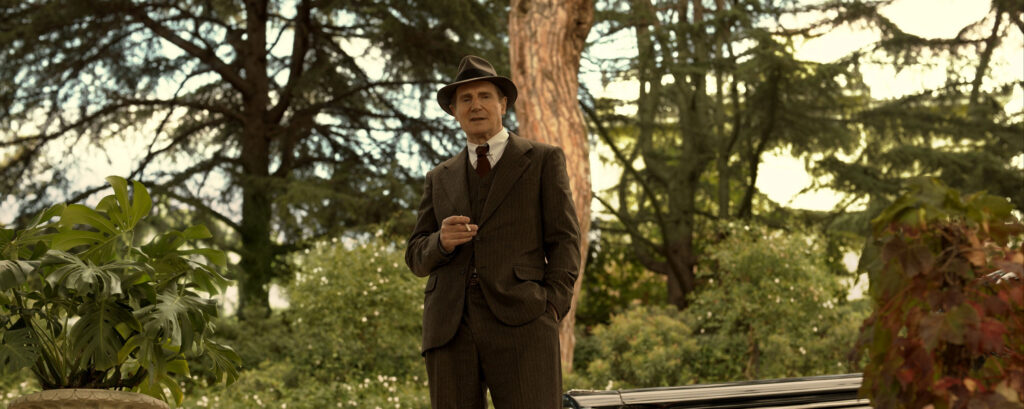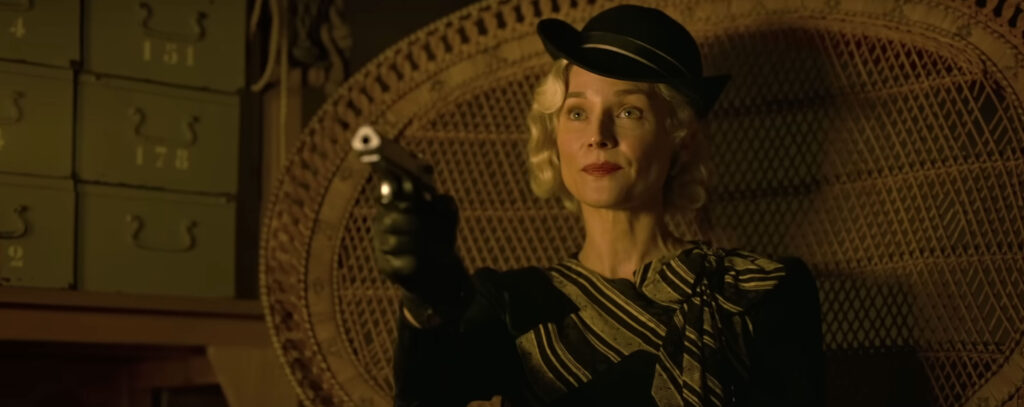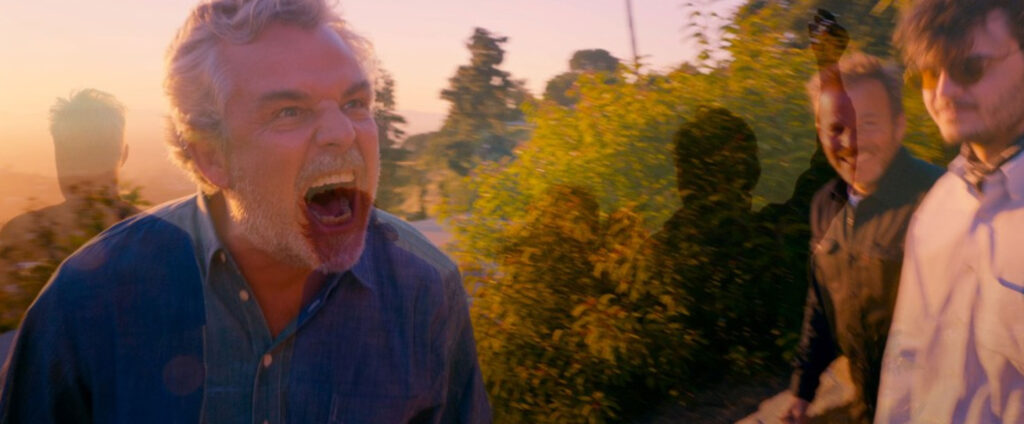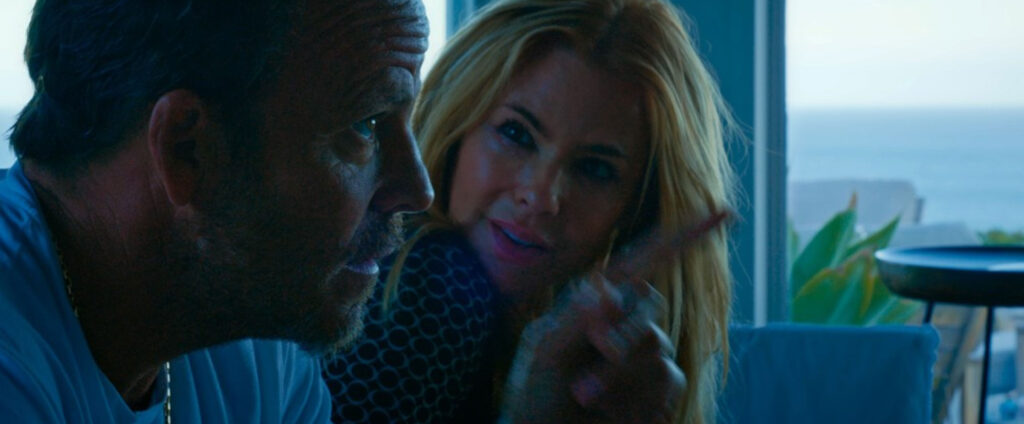July 30, 2023
by Carla Hay

Directed by Christopher Smith
Culture Representation: Taking place in the United Kingdom, the horror film “Concentration” features a nearly all-white cast of characters (with a few Asians and black people) representing the working-class and middle-class.
Culture Clash: A London-based ophthamologist goes to a mysterious convent in the Scottish Highlands to investigate the death of her priest brother, who is said to have murdered another priest and then committed suicide on the convent property.
Culture Audience: “Consecration” will appeal primarily to people who are fans of stars Jena Malone and Catholic-oriented horror movies that have flimsy stories and very little scares.
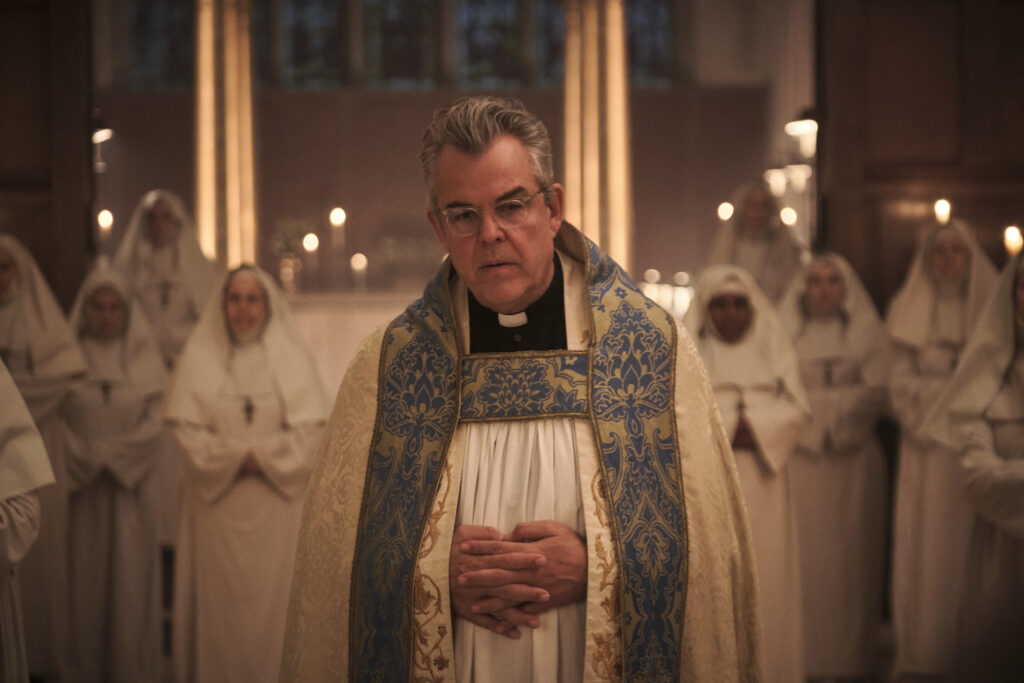
There has rarely been a genuinely great horror movie about nuns. “Consecration” is yet another in a long line of these misfires doing the usual stereotypes of uptight Catholic nuns in a substandard story about supernatural evil. The movie’s ending is awful.
Directed by Christopher Smith (who co-wrote the nonsensical “Consecration” screenplay with Laurie Cook), “Consecration has a story concept with the potential to be an interesting horror movie. However, the screenplay bungles and jumbles this concept at almost every turn. There are some visually striking images in “Consecration,” but visuals alone cannot make up for a weak and poorly conceived screenplay.
“Consecration” (which takes place in the United Kingdom) begins with viewers hearing a voiceover from a London-based ophthamologist named Grace Fario (played by Jena Malone) saying: “My brother used to believe I had a guardian angel. And I used to believe in nothing. But now, I’m not so sure.”
Grace is bachelorette who doesn’t live with any people but she has an orange tabby cat named Mr. Moo. One of the first scenes in the movie shows Grace referring a patient named Mrs. To (played by Valerie Saruf) and her husband Mr. To (played by Godwin To) to another experienced ophthamologist named Dr. John (played by Will Keen), who thinks Grace is competent but a bit eccentric. Dr. John calls Grace a “recluse.”
Grace is at home when she gets a devastating phone call: Her younger brother Michael (played by Steffan Gennydd in flashbacks), a Catholic priest who was living in Scotland, has been found dead at Mount Saviour Convent in the Scottish Highlands. Michael is said to have murdered another Catholic priest named Father Carol, who was visiting from Rome, before Michael supposedly killed himself by jumping off of a cliff. The convent is located on a remote cliff that overlooks a beach.
Grace, who is an atheist, doesn’t believe that Michael committed a murder/suicide. She immediately goes to Mount Saviour Convent to investigate. Grace is able to see Michael’s body before he is buried. And she immediately notices that his injuries do not look consistent with a suicide by jumping off of a cliff. Michael’s body was supposedly found on the beach, but Grace sees that there is no sand anywhere on his body.
During her investigation, Grace interacts with three people the most: Detective Chief Inspector Harris (played by Thoren Ferguson), who is polite and methodical, thinks Grace is interfering with his own investigation into Michael’s death. The convent’s Mother Superior (played by Janet Suzman) is stern and very superstitious. Father Russo (played by Danny Huston), who leads the religious ceremonies held at the convent, is domineering and quick-tempered.
DCI Harris tells Grace that the convent is on land owned by the Vatican. “Technically, we’re not in Scotland right now,” he adds. Mother Superior thinks she’s in another world altogether, as she tells Grace: “It was a demon, not your brother, who killed Father Carol.” Grace’s response to Mother Superior is this rude comment: “Cut the bullshit.”
The convent nuns are preparing a consecration ceremony to purify the land as a holy site after these gruesome deaths. Grace stays at the convent, because it’s the movie’s convenient way for Grace to personally witness all the creepy supernatural things that happen to her at this darkly lit convent, which doesn’t seem to know the meaning of electricity in every room.
Grace eventually finds out that the nuns have a bizarre punishment ritual where someone who has “sinned” has to stand on the cliff and take a step backward for every sin that person has committed. If the person falls backward off the cliff and dies, the nuns believe that it’s God’s way of showing that the person deserved to die this way.
Grace has the expected nightmarish visions in this cliché-ridden film, which over-relies on showing too many “jump scare” scenes that don’t really go anywhere and don’t add much to the plot. There are also mind-numbing scenes of Grace being annoyed by a young nun named Sister Beth (played Alexandra Lewis), who likes to play “peek-a-boo” type pranks on Grace. There are also predictable clashes between Grace and Mother Superior, who tells Grace: You are not how your brother described you; ‘calm, measured, full of grace.'” Mother Superior and Sister Beth are the only nuns in the movie who have memorable personalities.
Some of Grace’s backstory is revealed to give more clues about why Grace and Michael ended up having very different views about religion. The siblings’ father Vincent (played by Ian Pirie) is in prison for killing the siblings’ mother. There are a few flashback scenes showing the childhoods of Grace (played by Daisy Allen) and Michael (played by Kit Rakusen), as well as what happened on the day that their mother (played Victoria Donovan) died. The acting performances in “Consecration” range from mediocre to very unimpressive.
Unfortunately, so much of “Consecration” is too caught up in showing disconnected scenes that further muddle the overall story. Grace’s “investigation” never looks authentic or believable. And a lot of the movie’s dialogue is simply atrocious. There’s a scene where Sister Beth tells Grace: “I knew a man once. We rubbed our bellies so close together, it made black snakes appear. Don’t tell Mother.” After watching “Consecration,” the only blessing you might feel is that this time-wasting movie is finally over and is unlikely to ever get a sequel.
IFC Films released “Consecration” in select U.S. cinemas on February 10, 2023. The movie was released on digital and VOD on March 7, 2023.

